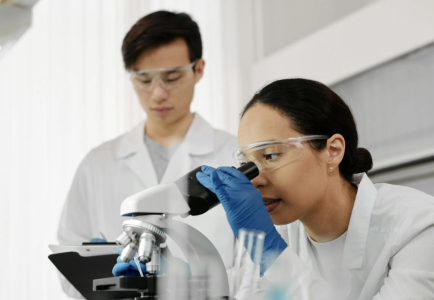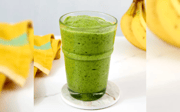Could your gut bacteria help protect you from toxic "forever chemicals"?
By
Veronica E.
- Replies 0
Disclaimer: The information provided in this article is for educational purposes only and is not intended as a substitute for professional medical advice, diagnosis, or treatment. Always consult your physician or other qualified healthcare providers with any questions you may have regarding a medical condition or before making any changes to your health regimen.
The products we use every day—nonstick pans, takeout wrappers, waterproof jackets—may seem harmless.
But many contain PFAS, also known as "forever chemicals," which can linger in our bodies for years and have been linked to serious health risks.
For years, scientists have searched for ways to remove these chemicals from the human body.
Now, new research out of the University of Cambridge may offer a surprising solution: the healthy bacteria already living in your gut.
Let’s explore what researchers discovered, how it works, and what it might mean for your long-term health.

What are forever chemicals—and why are they a concern?
PFAS, short for per- and polyfluoroalkyl substances, are man-made chemicals that resist water, oil, and stains.
They’re commonly used in items like food packaging, nonstick cookware, carpeting, and even some dental floss.
Because they don’t break down easily, PFAS build up in the environment—and in our bodies.
These chemicals have been found in the blood of nearly every American tested and have been linked to cancer, infertility, hormone disruptions, birth defects, and organ damage.
Once inside the body, PFAS can remain for years, creating long-term health concerns.
Also read: New study links everyday chemical to heart disease—what you should know
The gut bacteria discovery
In a promising study published in Nature Microbiology, scientists at the University of Cambridge introduced 38 strains of healthy human gut bacteria into lab mice.
When exposed to PFAS, the mice with the gut bacteria eliminated up to 74% more PFAS in their stool than those without.
In simpler terms, certain bacteria appeared to bind to the chemicals and help the body flush them out.
One standout strain, Odoribacter splanchnicus, was especially effective.
This bacterium is already known to support immune health and metabolism—and now, it may play a role in detoxification, too.
Also read: New study reveals millions exposed to toxic chemicals in drinking water
How does it work?
Researchers believe PFAS attach to the surface of these gut bacteria as they move through the digestive tract.
The bacteria then "trap" the chemicals and carry them out of the body through stool.
While most studies have focused on how PFAS accumulate, this is one of the first to show a potential way to remove them.
Also read: Is your favorite brand poisoning you? Discover the 17 brands labeled as most toxic!
Why this matters
PFAS are everywhere—in our homes, our water, and our food.
And while regulations are slowly changing, exposure is already widespread.
That’s why this new research offers such hope: instead of focusing only on avoidance, we may soon have a tool to help reduce PFAS levels in the body.
As Dr. Kiran Patil, the study’s senior author, explained, “Given the scale of the problem… it’s concerning that so little is being done about removing these from our bodies.”
This study could be a step in the right direction.
Also read: Are microplastics hiding in your favorite fast food? Find out!
Could probiotics help in the future?
The research team is now exploring probiotic supplements that might boost levels of PFAS-fighting bacteria in the human gut.
In theory, a daily probiotic could not only support digestion but also help protect against chemical build-up.
While the study was conducted in mice, scientists are hopeful that future human trials could confirm the same effect.
It may not be long before we’re using gut health to support environmental detox.
Also read: This beloved fruit is in danger: could a global fungus outbreak wipe it out forever?
In the meantime, how can you reduce PFAS exposure?
While researchers continue to explore probiotic solutions, there are steps you can take now:
This study is a powerful reminder that the tiniest organisms in our bodies may be doing big work behind the scenes.
As science learns more about the gut microbiome, it’s clear that it does much more than aid digestion—it may even help protect us from long-term environmental threats.
Read next: An eye for a…tooth? This man’s bizarre surgery seems like something out of the movies.

What do you think? Have you taken steps to avoid PFAS in your home or diet? Would you consider taking a probiotic if it helped remove harmful chemicals from the body?
We’d love to hear your thoughts—join the conversation in the comments and share your insights. The GrayVine community is here to learn, share, and support one another!
The products we use every day—nonstick pans, takeout wrappers, waterproof jackets—may seem harmless.
But many contain PFAS, also known as "forever chemicals," which can linger in our bodies for years and have been linked to serious health risks.
For years, scientists have searched for ways to remove these chemicals from the human body.
Now, new research out of the University of Cambridge may offer a surprising solution: the healthy bacteria already living in your gut.
Let’s explore what researchers discovered, how it works, and what it might mean for your long-term health.

New research suggests your gut bacteria may play a key role in flushing harmful "forever chemicals" from your body. Image Source: Pexels / Edward Jenner.
What are forever chemicals—and why are they a concern?
PFAS, short for per- and polyfluoroalkyl substances, are man-made chemicals that resist water, oil, and stains.
They’re commonly used in items like food packaging, nonstick cookware, carpeting, and even some dental floss.
Because they don’t break down easily, PFAS build up in the environment—and in our bodies.
These chemicals have been found in the blood of nearly every American tested and have been linked to cancer, infertility, hormone disruptions, birth defects, and organ damage.
Once inside the body, PFAS can remain for years, creating long-term health concerns.
Also read: New study links everyday chemical to heart disease—what you should know
The gut bacteria discovery
In a promising study published in Nature Microbiology, scientists at the University of Cambridge introduced 38 strains of healthy human gut bacteria into lab mice.
When exposed to PFAS, the mice with the gut bacteria eliminated up to 74% more PFAS in their stool than those without.
In simpler terms, certain bacteria appeared to bind to the chemicals and help the body flush them out.
One standout strain, Odoribacter splanchnicus, was especially effective.
This bacterium is already known to support immune health and metabolism—and now, it may play a role in detoxification, too.
How does it work?
Researchers believe PFAS attach to the surface of these gut bacteria as they move through the digestive tract.
The bacteria then "trap" the chemicals and carry them out of the body through stool.
While most studies have focused on how PFAS accumulate, this is one of the first to show a potential way to remove them.
Also read: Is your favorite brand poisoning you? Discover the 17 brands labeled as most toxic!
Why this matters
PFAS are everywhere—in our homes, our water, and our food.
And while regulations are slowly changing, exposure is already widespread.
That’s why this new research offers such hope: instead of focusing only on avoidance, we may soon have a tool to help reduce PFAS levels in the body.
As Dr. Kiran Patil, the study’s senior author, explained, “Given the scale of the problem… it’s concerning that so little is being done about removing these from our bodies.”
This study could be a step in the right direction.
Also read: Are microplastics hiding in your favorite fast food? Find out!
Could probiotics help in the future?
The research team is now exploring probiotic supplements that might boost levels of PFAS-fighting bacteria in the human gut.
In theory, a daily probiotic could not only support digestion but also help protect against chemical build-up.
While the study was conducted in mice, scientists are hopeful that future human trials could confirm the same effect.
It may not be long before we’re using gut health to support environmental detox.
Also read: This beloved fruit is in danger: could a global fungus outbreak wipe it out forever?
In the meantime, how can you reduce PFAS exposure?
While researchers continue to explore probiotic solutions, there are steps you can take now:
- Use a certified water filter: Many filters remove PFAS—check the label for certification.
- Avoid nonstick pans: Use stainless steel, ceramic, or cast iron instead.
- Reduce takeout packaging exposure: PFAS are often in wrappers and containers.
- Check product labels: Skip stain-resistant sprays and coatings when possible.
- Eat more fiber: Some research suggests dietary fiber may help bind PFAS in the gut.
This study is a powerful reminder that the tiniest organisms in our bodies may be doing big work behind the scenes.
As science learns more about the gut microbiome, it’s clear that it does much more than aid digestion—it may even help protect us from long-term environmental threats.
Read next: An eye for a…tooth? This man’s bizarre surgery seems like something out of the movies.
Key Takeaways
- Scientists at the University of Cambridge have found that certain strains of healthy gut bacteria can "soak up" toxic forever chemicals (PFAS), helping to remove them from the body through the stool.
- The study showed that mice with human gut bacteria had up to 74 percent more PFAS in their stool than those without, suggesting the bacteria help flush these chemicals out instead of letting them accumulate.
- PFAS, often found in household items like nonstick cookware and food wrappers, are known to increase the risk of cancer, infertility, and organ damage due to their tendency to stay in the body for years.
- Researchers are now working on probiotic supplements to boost the levels of these helpful bacteria in the human gut, with the hope of reducing the dangerous build-up of forever chemicals in people.
What do you think? Have you taken steps to avoid PFAS in your home or diet? Would you consider taking a probiotic if it helped remove harmful chemicals from the body?
We’d love to hear your thoughts—join the conversation in the comments and share your insights. The GrayVine community is here to learn, share, and support one another!






